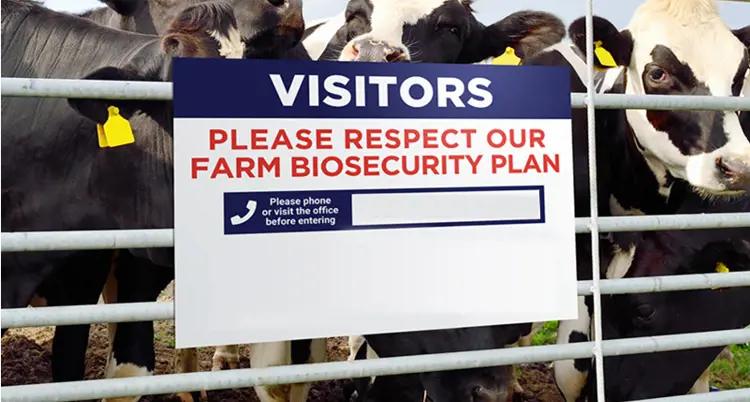Biosecurity on Dairy Farms, are we up to speed?
Biosecurity is a critical aspect of dairy farm management, particularly in South Africa, where diverse climates and farming practices can impact livestock health and productivity. Effective biosecurity measures help prevent the introduction and spread of infectious diseases, safeguarding herd health and the quality of dairy products.

Here are key biosecurity measures that should be implemented on dairy farms in South Africa:
Farm access control:
Restricting access to the farm is one of the primary biosecurity measures. Unauthorized personnel, vehicles, and equipment can introduce pathogens. Installing gates, locks, and clear signage helps control who enters the farm. Visitors should be required to sign in and follow strict hygiene protocols, such as disinfecting footwear and wearing clean clothing provided by the farm.
Quarantine procedures:
Newly acquired animals should be quarantined for a minimum of 30 days before integrating them into the main herd. This isolation period allows for monitoring any signs of illness and administering necessary vaccinations or treatments. Quarantine facilities should be located away from the main herd and have separate feeding and watering systems.
Vaccination and health management:
A robust vaccination program is essential to protect against common diseases such as foot-and-mouth disease, tuberculosis, and brucellosis. Regular health checks and prompt treatment of sick animals are crucial. Maintaining detailed health records helps track the health status of each animal and enables informed decisions about herd management.
Sanitation and hygiene:
Thorough cleaning and disinfection of calf facilities, equipment, and vehicles reduce the risk of disease transmission. Milking parlors, in particular, should be cleaned and sanitized regularly to prevent mastitis and other infections. Ensuring that workers follow strict hygiene practices, such as washing hands and wearing protective clothing, further minimizes risk.
Feed and water safety:
Providing clean, uncontaminated feed and water is vital. Feed should be stored in a way that prevents contamination by rodents, birds, and other animals. Water sources should be tested regularly for quality and cleanliness. Using reliable sources of feed and water reduces the risk of introducing pathogens through these essential resources.
Pest and wildlife control:
Rodents, birds, and other wildlife can carry diseases that affect dairy cattle. Implementing effective pest control measures, such as traps and bait stations, helps keep these animals away from feed storage and living areas. Fencing and other barriers can also prevent wildlife from accessing the farm.
Employee training:
Employees should be trained in biosecurity protocols and understand the importance of these measures. Regular training sessions ensure that all staff members are aware of the latest practices and remain vigilant in their daily routines. Encouraging a culture of biosecurity awareness among workers contributes to the overall health and safety of the farm.
Record keeping:
Maintaining accurate records of all biosecurity measures, including visitor logs, vaccination schedules, and health checks, helps monitor and improve biosecurity practices. These records can be invaluable in the event of a disease outbreak, aiding in tracing the source and controlling the spread of infection.
By implementing these biosecurity measures, dairy farms in South Africa can protect their herds from infectious diseases, improve productivity, and ensure the safety and quality of their dairy products. Biosecurity is an ongoing process that requires diligence, commitment, and adaptation to new challenges as they arise.
If you require any additional information regarding biosecurity on dairy farms or have further questions, please do not hesitate to contact your local technical advisor to ensure you are fully up to speed - www.deheus.co.za/meet-our-team.
